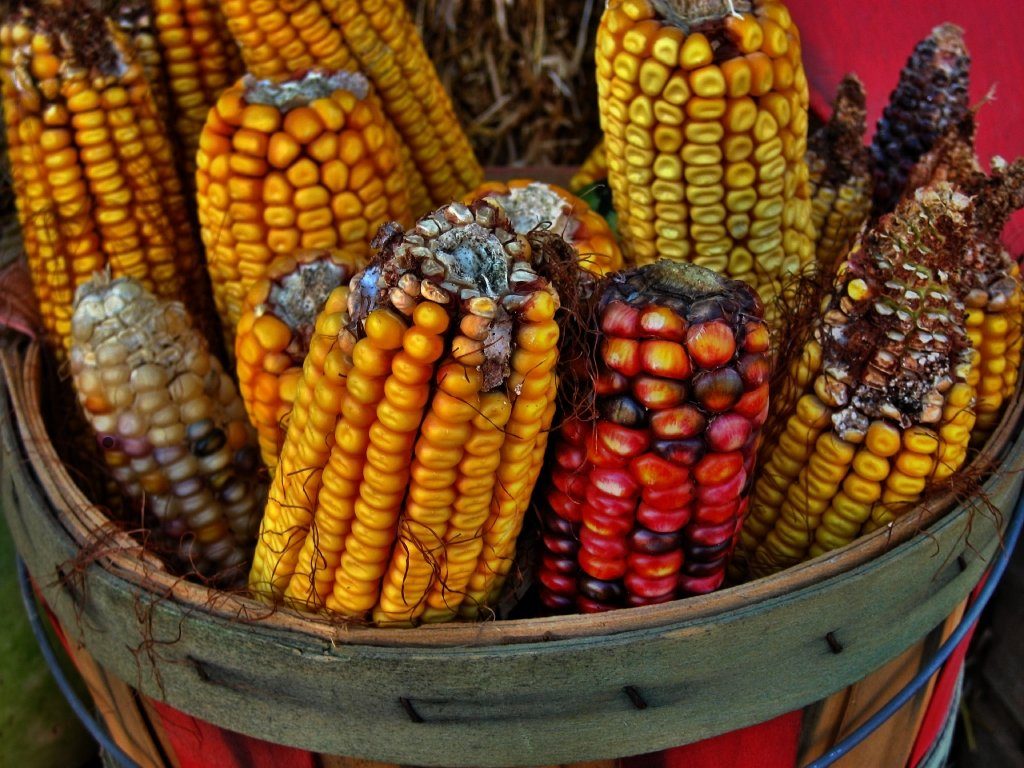A Corny Thanksgiving Posted by Gary Locke on Nov 23, 2016 in Culture, English Language, English Vocabulary

Corn. The history of the United States is uniquely tied to this one crop. So, too, is our language.
When the first English settlers arrived in what became Jamestown, Virginia in 1607 the colonists, unused to the rigors of agriculture, faced years of near starvation. They attempted to trade with the local natives for their corn, and soon Chief Powhatan of the tribes along the Chesapeake recognized the importance of this crop to the new arrivals. Powhatan excised high demands for his tribe’s corn. Captain John Smith, the leader of the colony, eventually led raids to steal the stored corn from the natives. Soon, it was the native Americans who were suffering deprivation. The result was years of war until the 1614 marriage of Powhatan’s daughter, Pocahontas, to colonist John Rolfe.
Colonists in Virginia, eager for cash, soon made tobacco their principle crop. But, for much of the rest of early America, corn was the staple. Today, with an estimated annual yield of over 13 billion bushels, no other country produces as much corn as the U.S. It finds its way into our gas tanks in the form of ethanol, innumerable food products, and even words, phrases, and idioms of our language.
In baseball, a can of corn is an idiom for an easy play, like when a fly ball lands into a fielder’s glove without the fielder having to move. Corn needs to be harvested, shucked, and cooked, but with canned corn you get the result without any effort.
A corn squabble is a fight over something petty, like a barnyard fight between chickens over a few nuggets of corn.
If you acknowledge the corn, you are admitting to an obvious mistake or misdeed, usually through a plea bargain. It probably refers to a case from the 19th century in which a man was arrested on charges of stealing a horse and a bushel of corn. Since the man was seen eating the corn, he is quoted as saying, “I acknowledge the corn, but not the horse.”
To be corned is to be drunk, perhaps (but not necessarily) on corn whiskey.
Cornpone is something which relates to, or appeals to, unsophisticated people. Corn farmers usually live in rural areas, away from more urban (or urbane) interests and means. Corn pone is a common bread or cake eaten at the table of humble farm families.
That brings us to Corny.
Initially, as early as the 14th century, corny referred to alcohol, and a taste or smell in beer or ale which was heavy with malt. In contemporary America, however, something which is corny is so sentimental or old fashioned as to be considered laughable. “Nobody does that anymore. It’s so corny!”
And yet, there has been a backlash against deriding the corny and sentimental. Sometimes, traditions and customs which may be corny are appreciated for what they are – a remembrance of simpler times. A song or a movie may be the very definition of corny, but that doesn’t mean that it won’t make you feel good.
As millions of Americans gather around their dinner tables for Thanksgiving, many of them will join in the custom of stating what they are thankful for. They might be thankful for the (American) football game on television, or the pie they are about to consume, or the wine on the table. But, they might also be thankful for the corny things, like family and laughter and love.
Tell us what you are thankful for. And don’t be afraid to be corny.
Photo by Reeza from Flickr

Build vocabulary, practice pronunciation, and more with Transparent Language Online. Available anytime, anywhere, on any device.



